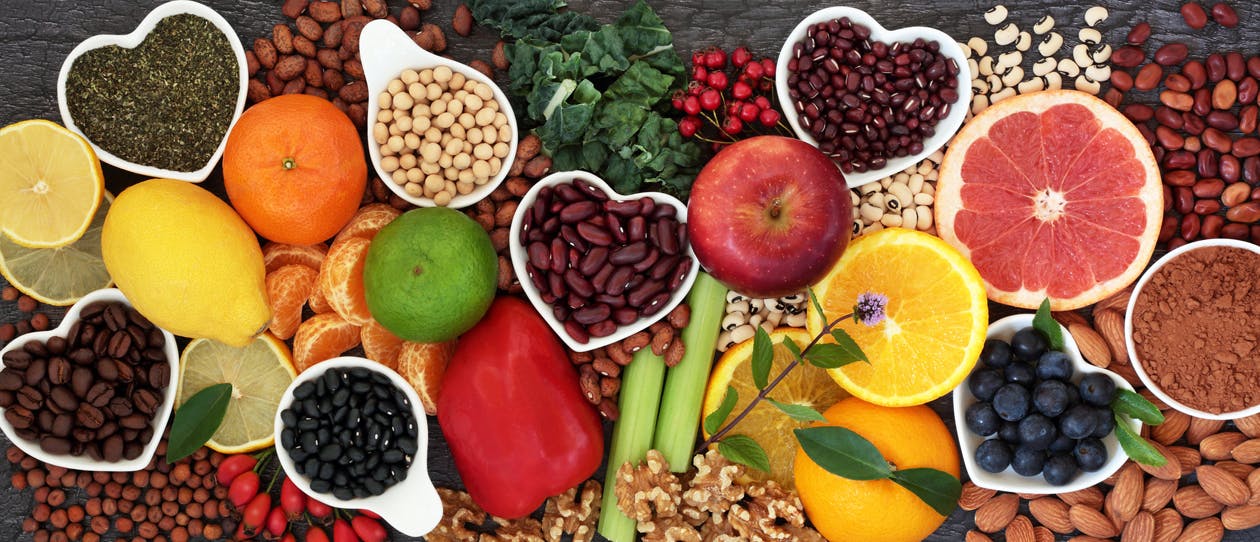
- Health hub/
- Tips & Advice on Improving your Everyday Health/
- Vitamins and Why You Need Them


Vitamins are used in the body for chemical reactions and metabolic processes that allow our body to function, grow and develop, and support the immune system. The advice from dietitians is that we should be getting most of our nutrient requirements from food. This shouldn’t be a problem, especially in developed countries where there is ready access to a wide variety of foods.
Yet, it can still be challenging, mainly due to our increasingly busy lifestyles, as well as the varying quality of food or inadequate knowledge of nutritional sources of vitamins and minerals. Sometimes, we may need a multivitamin to help support our diet.
What is a multivitamin?
Multivitamins are food supplements that typically contain a combination of vitamins and minerals, and can come in pill, capsule, liquid or tablet form. According to the European Food Council, they support adequate intake of nutrients when the diet alone is not enough to provide them.Who might need a multivitamin?
According to Harvard University, studies have shown that multivitamins may have little or no effect on those who already eat a varied, adequate, and healthy diet. However, multivitamins can play an important role when nutritional requirements cannot be met through diet alone.
Certain population groups are at a higher risk of nutrient deficiency and may have a higher chance of needing a multivitamin to meet their nutrient requirements. These include the older population due to difficulty chewing and swallowing food, trouble absorbing vitamin B12 from food, or decreased appetite due to feelings of isolation or loneliness.
Some people may be very fussy eaters, have very poor appetites or be so busy that a balanced diet is difficult to achieve.
It could be due to a vegan or vegetarian diet in which vitamin B12 may be low or from following a restricted diet for some time, such as one that might be prescribed after a surgical procedure. Certain surgeries can interfere with the normal absorption of nutrients. There are also health conditions that hamper the body’s ability to absorb nutrients.
There may be times when you may have a temporary increase in your nutrient needs, such as being pregnant or training for a major sports event.
When a multivitamin may not be required
A food-first approach is recommended for obtaining your recommended dietary intake of nutrients, and multivitamins do not replace a healthy diet.
According to Harvard University, the following are situations that may not need a multivitamin:
- When someone’s diet is healthy, but they are feeling tired a lot of the time. A visit to the doctor first to discuss other potential causes is recommended.
- Someone has a healthy diet, but they think it couldn’t hurt to get some extra nutrition from a vitamin.
- A deficiency in a nutrient has been diagnosed. In this case, only the individual nutrient may be needed rather than a multivitamin. For instance, micronutrients that were reportedly too low in diets in the most recent governmental Australian Health Survey (AHS) in 2011-12 were vitamin D and calcium. Those affected may only need the vitamin D or a vitamin D and calcium complex.
Downsides of multivitamins
The chemicals in foods, such as enzymes, minerals, and phytochemicals (plant chemicals), work together with vitamins in ways that supplements can’t because supplements don’t contain these chemicals.
Multivitamins don’t provide the flavour, fibre, texture, and sensory enjoyment you can get from food.
Food provides protein, carbohydrates, fibre, and phytochemicals that multivitamins don’t have and that are essential for maintaining the health and function of the body.
Vitamins in high quantities can be toxic and have harmful effects on the body. This could occur if you are already eating a nutrient-dense diet and topping up with multivitamins.
They can be more costly compared to eating whole foods such as vegetables, fruits, eggs, whole grains and proteins, especially if you choose what’s in season.
How to know if you need a multivitamin?
Multivitamins aren’t a cure for diseases or illnesses, and they are a short-term measure for what you should be eating in a healthy balanced diet daily. If you are unsure whether you might need a multivitamin, speak to your GP or a dietitian who will be able to assess your diet, health and lifestyle and make a recommendation based on this.Tips for obtaining vitamins and minerals from food
With busy lifestyles being one of the major challenges to fitting in all our nutrient requirements from food, here are some tips to help you achieve this:Nutrition:
As each food often contains more than one nutrient, eating a rainbow of different whole foods daily is key to obtaining a range of vitamins and minerals,.Smoothies:
If pressed for time, whip up a smoothie of berries, yoghurt, honey and milk, for a portable drink you can consume on the go for those busy mornings.Avoid processed foods:
Processed foods have lower nutrients due to the processing they go through, such as heating, drying and removal of skins from fruits and vegetables.Prioritise nutrient-dense foods:
Such foods include nuts, yoghurt, egg yolks, avocado, and fatty fish, including eggs, which, according to Australian Eggs, contain 13 different essential vitamins and nutrients along with omega 3 fatty acids and more.Soups:
Soups are also an efficient dish to enjoy in a hurry, for example, a vegetable soup in a cup.Salads:
A salad bowl full of vegetables already packed with nutrients can be boosted with other ingredients such as cheese, a great source of calcium, and eggs, a great source of vitamin D among other nutrients.Sprinkling nuts and seeds:
Sunflower, pepita, sesame seeds, and chopped nuts are full of healthy fats and vitamins and can be sprinkled on your salads and soups to add a boost of nutrients in seconds.Smart snacking:
By choosing your foods wisely, you can pack in a lot of vitamins and minerals. For instance, a wholegrain piece of bread with peanut butter and honey gives you healthy fats, vitamin B6, magnesium from the peanut butter, and fibre, folate, B vitamins and manganese from the bread.
REFERENCES
https://www.healthline.com/nutrition/how-to-eat-healthy-guide#bottom-line
https://www.eufic.org/en/vitamins-and-minerals/article/multivitamins-benefits-risks-for-health
https://www.betterhealth.vic.gov.au/health/healthyliving/vitamin-and-minerals




